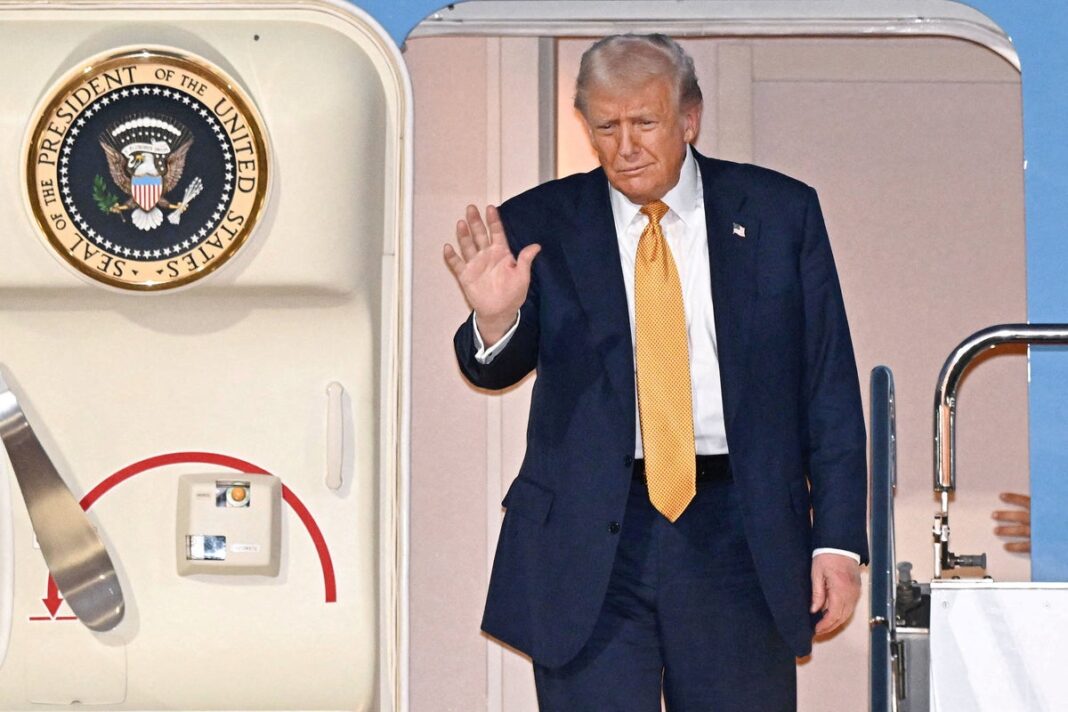Trump Confirms MRI Scan but Remains Vague on Details
Recent Medical Visit
In a recent press interaction while aboard Air Force One, former President Donald Trump shared intriguing news about his health, revealing he underwent an MRI scan at Walter Reed Medical Center. Trump described the scan as “perfect,” which has sparked a whirlwind of speculation regarding the reasons for the procedure. His statement was met with pressing inquiries about the purpose of the scan, to which he replied, “You can ask the doctors.”
Speculation and Mystery
This cryptic response has left many wondering about the underlying reasons for the scan. Was it routine, or did it stem from a specific health concern? Historically, Trump has been vocal about his medical assessments, including past claims about passing cognitive tests with ease. This behavior adds another layer of intrigue to the current situation.
His refusal to provide further details has led to a flurry of debates among political commentators and health experts alike. Some suggest that maintaining a degree of secrecy around his health can serve as both a political strategy and a way to shield his image. After all, public perception around health is crucial for political figures, and a well-managed narrative can significantly influence voter sentiment.
Trump’s Attitude Toward Cognitive Tests
Interestingly, during the same flight, Trump took the opportunity to direct criticism towards Congresswoman Alexandria Ocasio-Cortez, labeling her as “low IQ.” He proposed that she should take the same “very hard” cognitive tests he passed at Walter Reed. His descriptions of these tests, which included questions identifiable by their simplicity initially, escalate in complexity to more challenging ones. Trump appeared to relish in the idea of passing such a test as a measure of his intellectual capability against a prominent political opponent.
The Broader Context of Health Disclosures
This episode is not isolated in Trump’s history of sharing health information. In 2020, for instance, he boasted about a cognitive test where he was asked to remember a series of words. This pattern of behavior raises questions not just about his health but also about the politics of medical transparency in leadership.
Public debates surrounding political health disclosures reflect a broader trend in how leaders manage their public personas. The failure to divulge certain information can often lead to speculation and concern, particularly in light of Trump’s previous health concerns that were publicly scrutinized during his presidency.
Political Ramifications of Health Speculation
Speculation surrounding a political figure’s health can have tangible effects on their political capital. When the public feels uncertain about a leader’s health, it can lead to decreased confidence and, potentially, influence electoral outcomes. With Trump’s health status being closely monitored and often discussed in the media, this instance carries significance beyond just a medical check-up—it fits into a larger narrative of public trust and political strategy.
Media Reaction and Public Interest
The media has seized upon Trump’s latest revelation with razor-sharp scrutiny. Coverage has ranged from sensationalist to analytical, exploring both the implications of his “perfect” MRI and the broader context of Trump’s ongoing tumultuous relationship with his health and public image. This incident continues to fuel discussions on how politicians balance the need for privacy with public interest, particularly when it comes to their health.
Public reaction has varied widely, with some supporters praising Trump for being transparent, while critics argue that his vague answers only serve to foster further speculation. This divergence in interpretation underscores the polarized nature of contemporary political discourse.
Health as a Political Tool
Trump’s mention of his health comes in the wake of his ongoing presidential aspirations, with the 2024 elections looming. This alignment raises questions about whether revealing health details works as a strategic tool to reinforce his suitability for office. By highlighting the positive aspects of his health, he aims to counter narratives that question his vitality and fitness to lead.
The interplay between health disclosures and political gain remains a complex and evolving matter. As leaders navigate their public images, the choice to share—or withhold—personal health information continues to shape public perceptions in significant ways.
Conclusion
Trump’s confirmation of his MRI scan, coupled with his reluctance to elaborate, serves as yet another chapter in the ongoing story of his complex relationship with public health narratives. Whether for personal, political, or strategic reasons, the dynamics surrounding his health disclose something larger about the interplay of leadership, transparency, and public perception in the political arena. This incident may just be one of many that illustrate how health and politics are intricately intertwined in today’s society.



